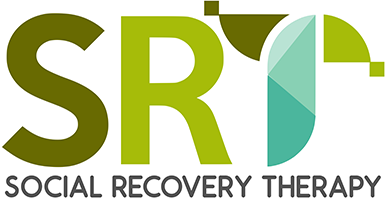SRT Implementation
SRT Implementation requires consideration of the following issues:
1. Support for the SRT ethos
- The central tenets of SRT should be supported by the wider service.
- This includes commitment to engage in active behavioural work outside the clinic room.
- Additionally, there must be understanding and flexibility to accommodate client disengagement and missed appointments.
2. Flexibility
- SRT therapists need to be flexible with regards to engagement, session length and timing, and session locations.
- SRT therapists may need to engage in case management or care co-ordination activities, advocacy and family work in order to address multi-systemic barriers to structured activity.
3. Capacity
- SRT therapists might need the capacity to travel and engage in longer sessions to offer flexibility and engage in active behavioural work outside the clinic room.
4. Knowledge of local area
- It is helpful if SRT therapists are equipped with knowledge regarding local organisations, institutions, and opportunities in order to help facilitate engagement in structured activity.
- Knowledge of local no and low-cost activities can offer opportunities for increasing structured activity in context of economic barriers.
SRT Implementation Supervision
SRT supervision should serve three functions (Proctor, 2001):
1. Normative
- Supporting SRT therapists to have manageable caseloads with consideration given to the need for flexibility.
- Supporting therapists in knowledge of local areas.
2. Formative
- Supporting SRT therapists in their knowledge and understanding of SRT theory and in cognitive and behavioural therapy skills.
- Frequent tape-rating sessions making use of the SRT Adherence Checklist and measures of cognitive/cognitive behavioural therapy competence are encouraged.
3. Restorative
- Supporting SRT therapists in their work with clients who may not traditionally be offered or engage in psychological therapy.
- Supporting SRT therapists to consider and discuss issues of complexity, the therapeutic relationship, disengagement, and shared hopelessness.
A combination of expert individual supervision, formal group and informal peer supervision are recommended, with expert individual supervision offered on a weekly basis. Supervisors should have experience of SRT therapy delivery. Formal supervision should be weekly, composed by a brief caseload review as well as in-depth case presentation and discussions, experiential approaches such as role-play, and audio recording assessments and discussions. Therapists should also be encouraged to frequently listen to their own sessions and reflect on their practice, stimulating their own inner supervisor.
Moreover, SRT therapists should work within teams operating at least partially within a physical ‘hub’ in order to have rapid access to peer or supervisor support as required. Informal discussions outside officially arranged supervision sessions help scaffold SRT therapist wellbeing, hopefulness and effectiveness.

